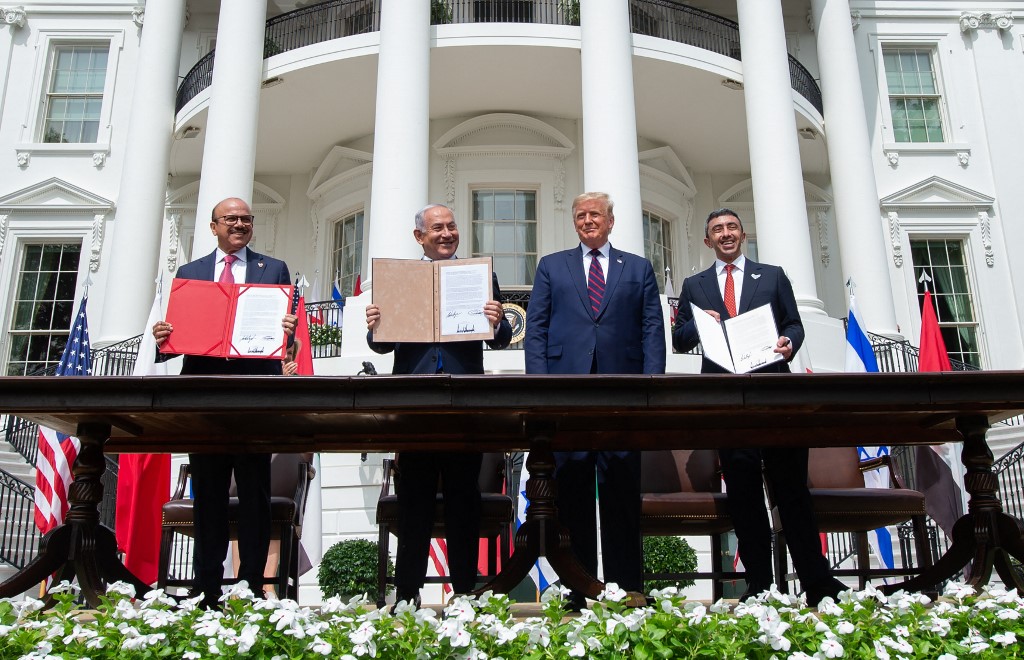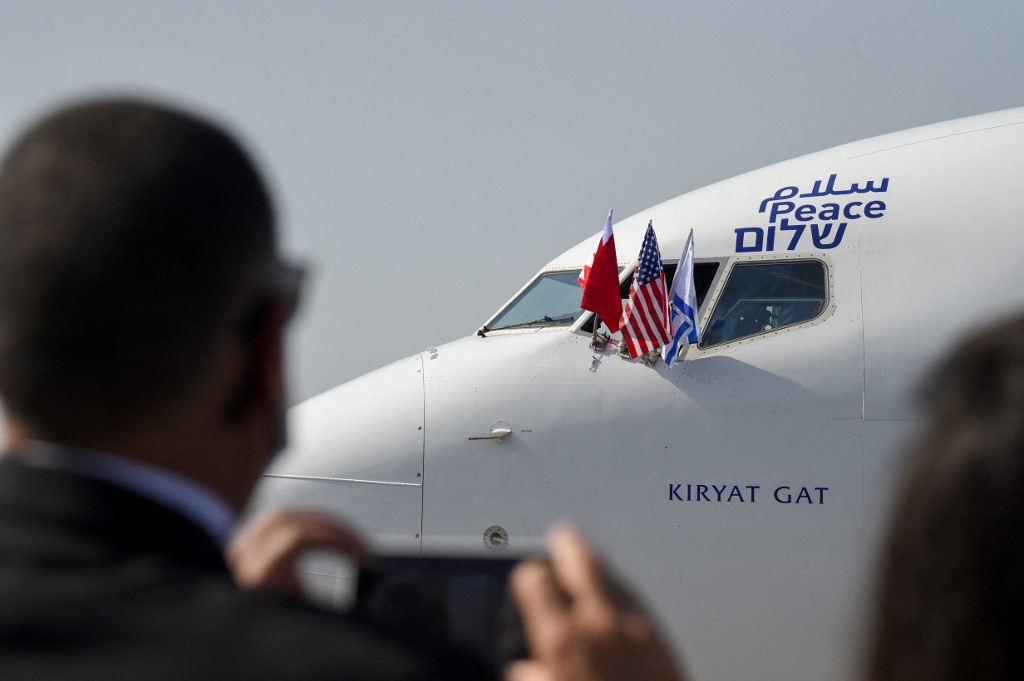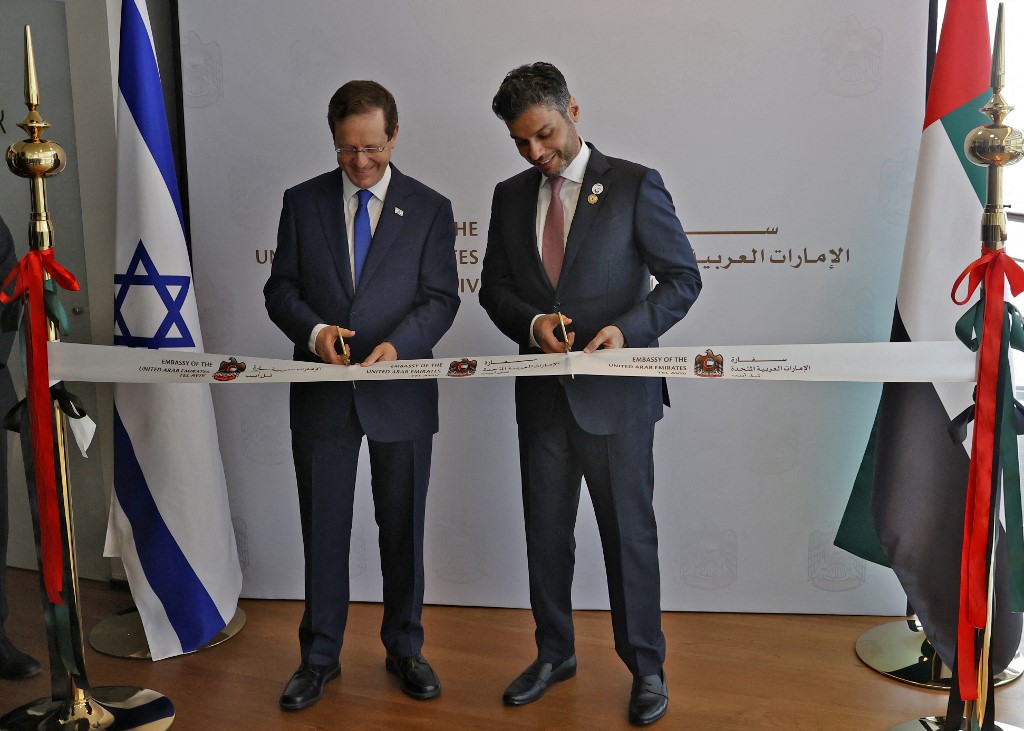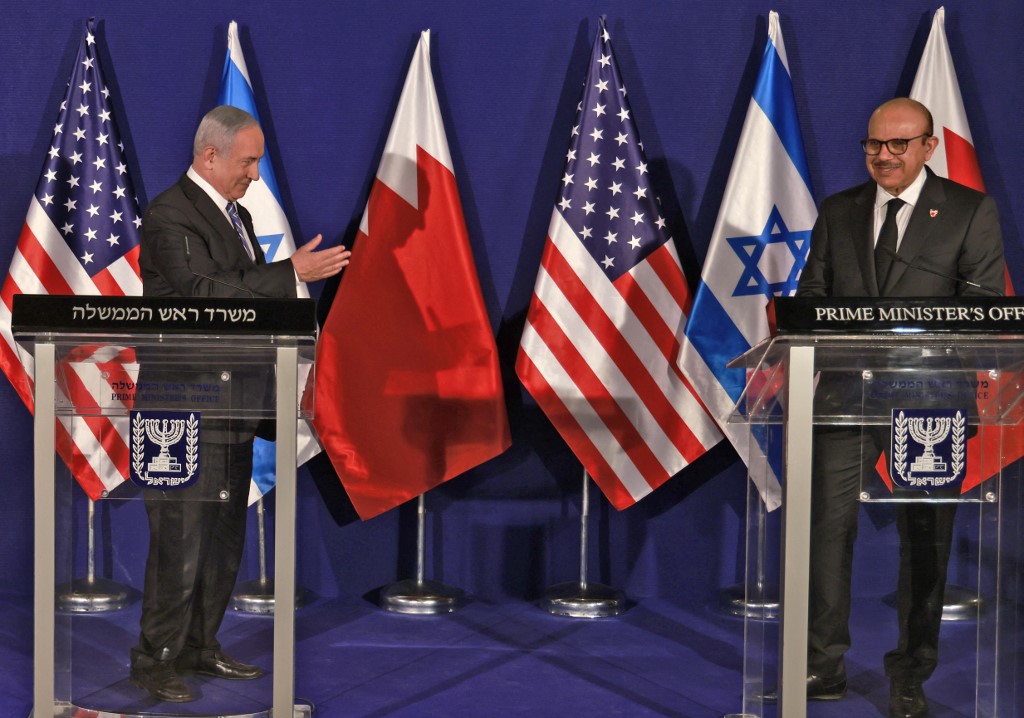DUBAI: One year ago, the UAE became the first Arab country to sign the Abraham Accords, a series of US-brokered diplomatic agreements inked between Israel and Arab states.
The Aug. 13 signing marked the first time an Arab country had publicly established relations with Israel since Egypt in 1979, and then Jordan in 1994. Bahrain followed suit on Sept. 11 last year.
The rapprochement between the UAE and Israel was remarkable in many ways given their long history of animosity over the rights of the Palestinian people.
Those in favor of the deal have lauded the prospects for trade and commerce, which economists predict could be worth $6.5 billion annually.
Dorian Barak, co-founder of the UAE-Israel Business Council, told Arab News: “We’re on track to reach $3 billion in annual trade by 2025, with some estimating even more.
“Some of this is bilateral, but much more of it is Israel trading with and through the UAE as a gateway to other markets in the region, from the large economies in the Arab world to India, South Asia, and beyond.”
Others are skeptical that the pact will promote peace in the region or encourage a resolution to the decades-old Arab-Israeli conflict.
Dr. Abdulkhaleq Abdulla, an Emirati political analyst, told Arab News: “After one year, we are seeing that this accord has two legs. There is a strong leg and a weaker one.

Bahrain Foreign Minister Abdullatif Al-Zayani, Israeli Prime Minister Benjamin Netanyahu, US President Donald Trump, and UAE Foreign Minister Abdullah bin Zayed Al-Nahyan hold up documents after participating in the signing of the Abraham Accords where the countries of Bahrain and the UAE recognize Israel, at the White House in Washington, DC, September 15, 2020. (AFP/File Photo)
“The first and strongest is the pragmatist or realist leg — and this is the one that is here to stay. This is the leg that is beneficial to both (the UAE and Israel) and has to do with all economic, technological, and strategic benefits that come with the accords.
“The second and weaker leg is the idealistic one — the one that has promised peace and stability to the region and prosperity to the Palestinians. This leg is not proving as strong as the national interests that bind the UAE and Israel together,” he said.
On Sept. 15, 2020, the UAE, Bahrain and Israel agreed the Abraham Accords Declaration, stating their recognition of “the importance of maintaining and strengthening peace in the Middle East and around the world based on mutual understanding and coexistence, as well as respect for human dignity and freedom, including religious freedom.”
It was signed at the White House in Washington, D.C. by the UAE’s Foreign Minister Abdullah bin Zayed Al-Nahyan, his Bahraini counterpart Abdullatif bin Rashid Al-Zayani, then-Israeli Prime Minister Benjamin Netanyahu, and then-US President Donald Trump.
When the COVID-19 pandemic travel restrictions began to be relaxed in autumn of last year, the first direct commercial flights took off between Tel Aviv and Dubai, with thousands of tourist and business travelers setting foot on one another’s soil for the first time.
Dubai witnessed changes almost overnight. Suddenly, Hebrew could be heard in public places, yarmulke-wearing men became a common sight, and Jews based in the emirate began worshipping openly. Kosher food started to appear on menus at major hotels and on commercial flights to cater to the growing Jewish clientele.

The Bahraini, Israeli and US flags are pictured attached to the Boeing 737 aircraft of Israel's El Al, adorned with the word "peace" in Arabic, English and Hebrew, upon landing at the Bahrain International Airport on October 18, 2020. (AFP/File Photo)
In order to maintain the momentum of interfaith understanding, plans were soon underway for the Abrahamic Family House in Abu Dhabi.
Scheduled to open in 2022 and designed by award-winning Ghanaian architect Sir David Adjaye, the structure will host a church, synagogue, and mosque to celebrate the fraternity of the three monotheistic faiths.
The apparent success of the Abraham Accords quickly inspired other nations to join. In October, Sudan became the third Arab country to sign up to the agreements, followed in December by Morocco.
Recently, in reply to a question on whether Saudi Arabia was thinking of coming on board, Foreign Minister Prince Faisal bin Farhan praised the agreements but said that a Palestinian settlement would result in complete normalization for Israel across the region.
“Overall, the Abraham Accords have had a positive effect on relations in the region and we must build on that by finding a solution for the Palestinians,” he told the Aspen Security Forum.
The hope among the agreements’ supporters, particularly Jewish communities throughout the Arab world, is that it will promote further dialogue.
Yehuda Sarna, the UAE’s chief rabbi, told Arab News: “My prediction one year ago was that the opening up of diplomatic relations would break down stereotypes between Arabs and Jews, pressing the reset button to the relationship between civilizations.
“That is exactly what has occurred; hundreds of thousands of people have encountered each other in person, mostly in the UAE, and millions more have engaged online, in positive and inspiring ways.”

Israeli President Isaac Herzog (L) and Emirati Ambassador to Israel Mohamed Al-Khaja cut the ribbon at the new UAE embassy in Tel Aviv on July 14, 2021. (AFP/File Photo)
Sarna, who also serves as the executive director for Jewish Student Life at New York University, said the Jewish community in the UAE was, “in the process of building the civil society infrastructure to support these interactions, including researching how best to bring people together, developing local religious and educational institutions, as well as organizations for cultural exchange.”
To mark the one-year anniversary of the agreement, Sarna has written “a prayer for the region as a whole,” which will be distributed to more than 1,000 synagogues worldwide, including those associated with the Rabbinical Council of America.
Although the agreements have shown potential for prosperity in the region, critics have pointed out they have so far done little to promote peace between the Israelis and the Palestinians or brought the Palestinians any closer to statehood.
The strength of the Abraham Accords was tested at the end of May this year when Israel and the Palestinian militant group Hamas, which controls the Gaza Strip, fought an 11-day war.
Abdulla, the Emirati political analyst, said: “As we have seen in Gaza, and have seen all along, the accords will not bring peace and prosperity to the region as promised.” And he noted that they would not guarantee the legitimacy of the Palestinians’ aspirations for a state.
“What happened in May was a huge setback to the accords, but it did not reverse them, and it seems nothing will. Israel wants them and the US wants them, but they will not bring peace to the region,” he added.

Israeli Prime Minister Benjamin Netanyahu gestures towards Bahrain's Foreign Minister Abdullatif bin Rashid Al-Zayani as he speaks during a press conference. (AFP/File Photo)
When clashes erupted between Jews and Arabs in Jerusalem in May, the governments of Bahrain, Morocco, Sudan, and the UAE were pressured by their own publics to side with the Palestinians.
How Arab governments respond to the cycle of violence, particularly those states that have signed up to the Abraham Accords, will no doubt prove critical to the future of the Arab-Israeli rapprochement.
Hussain Abdul-Hussain, a research fellow at the Foundation for Defense of Democracies (FDD) in Washington, D.C., told Arab News: “Over recent decades, the Arabs have made anti-Israel rhetoric sacrosanct, almost divine.
“When policies and divinities mix, both are spoiled. Today, the Arabs who understand how modern economies work realize that peace with Israel is not about revenge or honor, but about growing the economy.
“Peace is a definite multiplier of economic growth, and the UAE’s figures prove that. Such Arabs are ready for peace, but they are usually scared of the public shaming that comes with calls for peace with Israel.”

Israeli President Isaac Herzog (C), Emirati Ambassador to Israel Mohamed Al-Khaja (C-R), Emirati Minister of State for Food and Water Security Mariam Al-Muhairi and former minister Gabi Ashkenazi, open the Israeli stock market in Tel Aviv on July 14, 2021 on the same building of the new UAE embassy. (AFP/File Photo)
Whatever their long-term impact on the region, the Abraham Accords are an undeniable sign of a thaw in long-frozen Arab-Israeli relations.
In the words of Houda Nonoo, Bahrain’s former ambassador to the US, the agreements will “no doubt be one of the biggest Middle East milestones in our lifetime.”
She told Arab News: “As we embark on a new era in the Bahrain-Israel relationship, it is important to remember that at the core of this agreement is the desire to create a new Middle East, one built on peace and prosperity for all.
“I believe that the growing partnerships between Bahrain and Israel will lead to sustainable peace in the region.”
---------------------
Twitter: @rebeccaaproctor




























